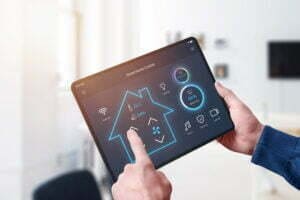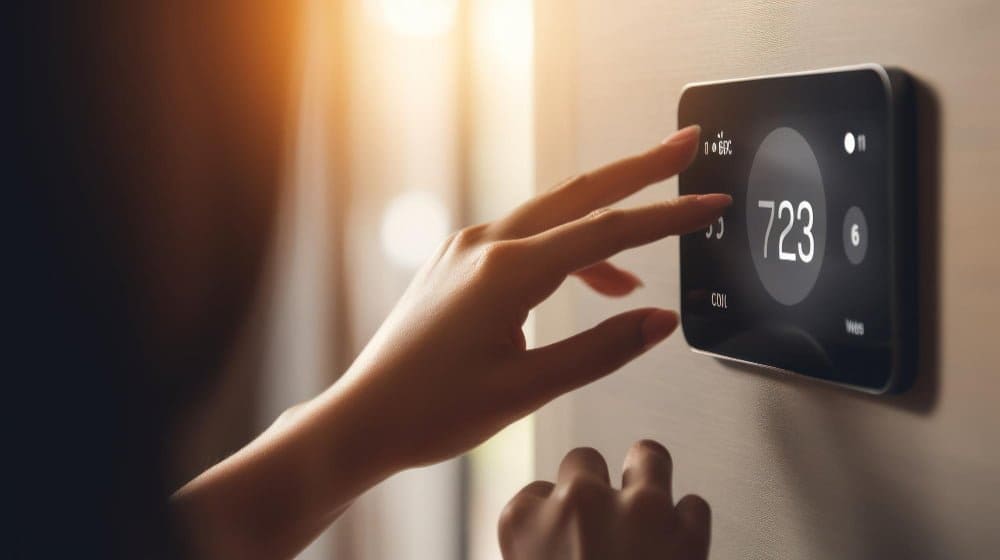Imagine if you could effortlessly control the temperature of your home, from anywhere in the world, with just a few taps on your smartphone. With a smart thermostat, this futuristic notion becomes a reality. Gone are the days of manually adjusting your thermostat and wasting energy when no one is home. A smart thermostat not only provides you with convenience, but it also offers a whole host of benefits that can save you money, increase your comfort, and even reduce your carbon footprint. From learning your preferences to optimizing energy usage, discover the incredible advantages of having a smart thermostat in your home.

Energy Efficiency
Having a smart thermostat installed in your home can greatly contribute to reduced energy consumption. Traditional thermostats rely on manual adjustments to regulate temperature, often resulting in wasted energy when you forget to adjust the settings before leaving the house or going to bed. Smart thermostats, on the other hand, utilize advanced technology to automatically adjust temperature settings based on your habits and preferences, ensuring that your HVAC system runs efficiently and only when necessary. By optimizing energy usage, smart thermostats can help you save on utility bills in the long run.
Convenience and Comfort
One of the key advantages of a smart thermostat is the convenience and comfort it offers. With remote access and control capabilities, you can easily adjust the temperature of your home from anywhere using your smartphone or other connected devices. If you’re away for a vacation or unexpectedly need to stay out longer, you can lower the temperature remotely to avoid wasting energy. Additionally, smart thermostats allow for customized scheduling, enabling you to set different temperature preferences for different times of the day. This means you can wake up to a warm and cozy house in the morning, and have it cool down when you go to bed. Moreover, smart thermostats can integrate with other devices in your home, such as smart lights or smart locks, creating a seamless and interconnected smart home experience.
Increased Savings
By providing detailed energy usage data, smart thermostats empower you to make informed decisions about your energy consumption. With access to information about your heating and cooling patterns, you can identify areas where you can make improvements to save energy and lower your utility bills. Additionally, smart thermostats often come with features like optimal temperature settings, where they automatically adjust the temperature based on weather conditions or occupancy. This means you don’t have to constantly tweak the thermostat to maintain a comfortable temperature, as the smart thermostat will do it for you. These proactive adjustments not only save energy but also reduce wear and tear on your HVAC system, potentially extending its lifespan.
Improved Air Quality
Apart from temperature control, smart thermostats can also help improve the air quality in your home. Many models come with built-in filters and humidity control features, ensuring that the air circulating in your house is clean and properly humidified. These smart thermostats can monitor air quality, detecting factors such as pollutants, allergens, or excessively dry conditions. If the air quality is compromised, the thermostat can send you notifications so that you can take appropriate actions like replacing filters or adjusting humidity levels. This proactive approach to air quality monitoring can be especially beneficial for individuals with allergies or respiratory conditions.

Enhanced Safety
Safety is paramount when it comes to your home, and smart thermostats offer several features that contribute to a safer living environment. The thermostat can alert you of any unusual temperature changes that could indicate a potential hazard, such as a malfunctioning HVAC system or a fire. By receiving these smart alerts, you can take immediate action or contact professionals for assistance. Furthermore, smart thermostats can monitor the performance of your HVAC system, detecting irregularities or malfunctions. By catching problems early on, you can avoid costly repairs or potential health hazards. Some smart thermostats also utilize geofencing technology, allowing them to automatically adjust the temperature when you leave or enter a predefined area. This ensures that you never waste energy heating or cooling an empty house.
Easy Installation and Use
Installing and using a smart thermostat is typically a hassle-free experience. Most smart thermostats are compatible with the majority of HVAC systems, making it easy for you to integrate them into your home. Additionally, they usually come with a user-friendly interface and guided installation instructions, enabling you to set up the thermostat without the need for professional assistance. Once installed, the intuitive interface makes it easy to adjust settings, create schedules, and access energy data. Whether you are tech-savvy or not, operating a smart thermostat is a straightforward process, putting you in control of your home’s comfort and energy efficiency.

Cost-Effective
Investing in a smart thermostat can have long-term cost-saving benefits. By optimizing your energy usage, you can significantly reduce your utility bills over time. The ability to remotely control and adjust your thermostat ensures that you never waste energy when you’re away from home or when you forget to make adjustments manually. Additionally, in some regions, you may be eligible for rebates or incentives when you install a smart thermostat, further offsetting the initial cost. Furthermore, smart thermostats now come in a variety of models and price ranges, making it easier to find an affordable option that fits your budget.
Environmental Impact
Using a smart thermostat is not only beneficial for your wallet but also for the environment. By reducing your energy consumption and optimizing temperature settings, you can decrease your carbon footprint and contribute to a more sustainable living. Many smart thermostats also integrate with renewable energy sources, such as solar panels, allowing you to harness clean energy for heating and cooling your home. By embracing smart technology and energy-efficient practices, you are actively participating in the global effort towards reducing greenhouse gas emissions and combatting climate change.
Advanced Features
Smart thermostats come packed with advanced features that enhance the overall functionality and performance of your HVAC system. With learning algorithms, the thermostat can adapt to your habits and preferences over time, efficiently maintaining your desired comfort levels without constant manual adjustments. The adaptive technology utilized by smart thermostats ensures efficient heating and cooling, as it takes into account external factors like weather conditions and occupancy patterns when regulating temperature. Some smart thermostats also offer voice control capabilities and integration with popular virtual assistants, allowing you to easily adjust settings using simple voice commands.
Smart Thermostat Types
There are several types of smart thermostats available on the market, each offering unique features and functionalities. Programmable thermostats allow you to set temperature schedules in advance, enabling you to save energy and maintain comfort throughout the day without constant manual adjustments. Learning thermostats go a step further by analyzing your temperature preferences and habits, automatically adjusting settings to optimize energy usage and comfort. Remote-access thermostats provide the convenience of controlling your thermostat from anywhere using a connected device, ensuring that you can always come home to the perfect temperature. The variety and versatility of smart thermostats ensure that you can find the perfect solution for your home’s heating and cooling needs.
